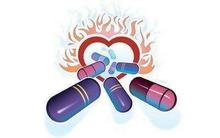
Proton-pump inhibitors (PPIs) are a group of drugs designed to reduce stomach acid production. They are commonly prescribed for the prevention and treatment of acid-related conditions such as oesophageal duodenal and stomach ulcers, gastroesophageal reflux disease, and non-steroidal anti-inflammatory drug-associated ulcers. In Australia, there were over 19 million prescriptions filled in
Commonly-used PPIs include omeprazole (Prilosec, Prilosec OTC, Zegerid), lansoprazole (Prevacid), pantoprazole (Protonix), rabeprazole (Aciphex), esomeprazole (Nexium) and dexlansoprazole (Dexilant).
Regular PPI use has been linked with an increased risk of fractures, pneumonia, Clostridium
In one study, researchers examined the association between PPI use and depressive symptoms in an elderly population (age 75 years and older) [2]. They found that the use of PPIs was associated with a higher depression score on a validated depression questionnaire. Furthermore, higher doses of PPIs were associated with an increased probability of depression. The researchers confirmed that this increased risk of depression in PPI users was not simply due to people having an ulcer. Results of the study are summarised in the image below [2].

In another study, 2,366 people who were prescribed PPIs and subsequently developed major depressive disorder were compared to 9,464 people without major depressive disorder [3]. The researchers found that people taking PPIs for a greater number of days had a higher risk of depression. For example, people taking PPIs for 121 to 365 days had a 60% greater risk of depression and people taking them for greater than 365 days had a 108% greater risk of depression. Higher depression risk was particularly associated with the PPIs pantoprazole, lansoprazole and rabeprazole, whereas only a trend was noted in groups using omeprazole and esomeprazole.
PPIs may influence depression through several mechanisms. For example, they can affect nutrient absorption, potentially leading to deficiencies in B vitamins, magnesium, zinc, and amino acids. These nutrients are essential to produce mood-lifting neurotransmitters and hormones. PPIs can also affect the composition of our gut microbiota (gut bacteria). The composition of our gut microbiota has been linked to depression as they can produce neurotransmitters such as serotonin and GABA, produce nutrients, and are involved in our immune system (just to name a few).
While further research is required to confirm these results, it highlights the importance of limiting the use of prescription medications by only taking essential medications and using them for only as long as needed. Where possible, long-term use should be avoided (although always consult with your doctor).